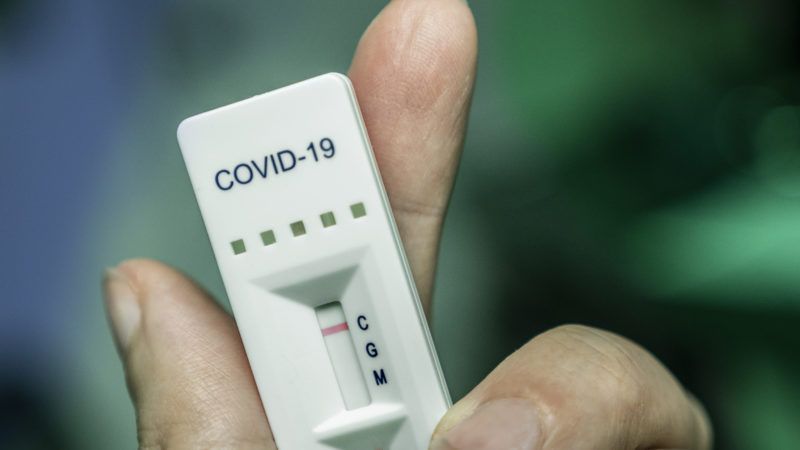To Really Reopen the Economy, At-Home Diagnostic COVID-19 Tests Are Our Best Bet
Making cheap tests widely available would go a long way toward crushing the pandemic.

Testing yourself and your family every day for COVID-19 with a cheap, easy-to-use, 10-minute test could be the game changer for crushing the epidemic and getting everybody safely back to work and play. Widespread deployment of home antigen testing could make this scenario possible.
Right now current infections can only be diagnosed using expensive complicated molecular laboratory tests for the presence of the virus. While some point-of-care diagnostic lab tests have been deployed, most require that samples be sent off-site and generally take at least a day or two to report back results.
Blood tests for antibodies produced by an individual's immune system can tell him or her that they have been infected by the coronavirus in the past even if they had experienced no symptoms. Right now blood samples must be sent off-site to labs for testing, but some companies are working on at-home tests that should be available soon and would give results in minutes. But since antibodies develop about two weeks after infection, tests like these are not particularly useful for preventing future infections.
Antigen testing, however, can solve the problem of obtaining rapid diagnoses at home and at work. A positive test would enable infected people to voluntarily, quickly self-isolate and thus break the chains of infection that are fueling the epidemic. Viral proteins trigger a person's immune system to produce antibodies to trap and destroy them, thus viral proteins are antibody-generators, or, antigens. Antigen tests work by coating a test strip with antibodies specific to coronavirus antigens. The antibodies on the test strip emit a signal such as a color change if they detect the presence of the coronavirus.
The Food and Drug Administration approved the first coronavirus antigen test from the testing company Quidel Corporation earlier this month. It is still a point-of-care test for use by clinics and in doctor's offices that provides results in 15 minutes using one of its 36,000 test machines installed around the country. However, a number of companies including Mologic, OraSure, and E25Bio, are working on antigen self-tests that could cost as little as $1 dollar each and be used at home and at work to detect coronavirus infection within minutes, much like home HIV tests and home pregnancy tests. Antigen tests tend to be less accurate than molecular or blood tests, producing more false negatives. However, frequent repeated testing can uncover the false negatives and thus continue to help break the chains of contagion.
In April, White House coronavirus task force coordinator Dr. Deborah Birx called antigen testing a "breakthrough innovation" that can help "screen large numbers of individuals quickly." Also in April, the National Institutes of Health launched its $500 million Rapid Acceleration of Diagnostics (RADx) initiative in which companies compete to develop diagnostic tests. The goal of RADx is to make millions of new coronavirus tests available by the end of this summer. Using antigen tests is a much faster way to open the economy than waiting on and hoping for an effective vaccine. Deploying them can be achieved in months, not a year to 18 months.
Various plans for how mass testing could keep the epidemic in check have been outlined. For example, Nobel economist Paul Romer and his colleagues have noted how "population-scale testing can suppress the spread of COVID-19" by means of frequent testing. Romer suggests that such testing might cost as much as $100 billion to implement, but adds that the cost pales in comparison to the jobs and trillions lost due to lockdowns. In fact, providing 300 million Americans with at-home test kits costing $1 each for weekly use would cost $15.6 billion. Knowing that their fellow citizens are taking responsibility for their microbes would give people the confidence to venture out of lockdown and return to work, travel, and the pleasures of bars, restaurants, concerts, sporting events, and movies.


Show Comments (102)